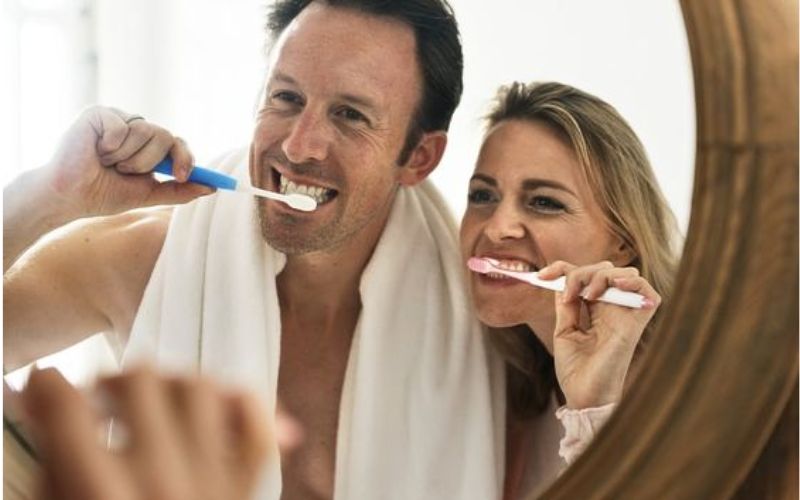Taking good care of your teeth is crucial for both your overall health and your self-confidence. Healthy teeth contribute significantly to general well-being and help maintain that glowing smile. Conversely, poor oral hygiene can lead to dental issues that might affect your smile and self-esteem.
How Do you Take Care of Your Teeth – Essential Steps
Brushing Your Teeth

Importance of Brushing: It’s essential to brush your teeth twice daily: once in the morning and once at night. This helps remove plaque and prevent tooth decay.
Choosing the Right Toothbrush: Use a soft-bristled toothbrush that fits comfortably in your mouth.
Proper Brushing Technique:
- Angle the brush at a 45-degree angle to your gums.
- Motion: Use gentle, circular motions and short back-and-forth strokes.
- Coverage: Make sure to brush all surfaces of each tooth including the front, back, and chewing surfaces.
- Tongue: Don’t forget to brush your tongue to remove bacteria and freshen your breath.
- Duration: Spend at least 2 minutes brushing your teeth.
- Replacing Your Toothbrush: Change your toothbrush every 3 to 4 months, or sooner if the bristles become frayed.
Flossing

Importance of Flossing: Flossing is crucial for removing plaque and food particles from between your teeth, where your toothbrush can’t reach.
Flossing Options: You can choose from traditional dental floss, flossers, or water flossers based on what feels best for you.
Proper Flossing Technique:
- Use a fresh section of floss for each tooth.
- Gently curve the floss around the base of each tooth to clean effectively.
Rinse

Rinsing your mouth with mouthwash can help remove any lingering particles after brushing and flossing. Use a fluoride-containing mouthwash for extra protection against cavities, but remember, it’s not a substitute for brushing or flossing.
Visit Your Dentist

Regular dental checkups and cleanings (typically twice a year) are essential for maintaining dental health. These visits allow for the early detection of problems, saving money and discomfort in the long run. Professional cleanings can remove plaque and tartar that brushing and flossing alone might miss.
Eat a Well-Balanced Diet

Your diet significantly impacts oral health. Eating a diet rich in fruits, vegetables, and whole grains supports healthy teeth and gums. Limit sugary and acidic foods that can accelerate tooth decay.
Limit Sugar
Sugar is a major culprit in dental health issues. It feeds the bacteria that cause plaque and cavities.
Tips to Reduce Sugar Intake:
- Avoid sugary drinks like sodas and fruit juices.
- Watch out for hidden sugars in processed foods.
- Opt for natural sweeteners such as fruits.
Quit Smoking

Smoking can have severe impacts on oral health, increasing the risk of gum disease, oral cancer, and tooth loss. Quitting smoking significantly benefits your oral and overall health.
Side Effects of Not Taking Care of Your Teeth
- Tooth Decay: If not properly cared for, teeth can decay, leading to cavities.
- Gum Disease: Poor oral hygiene can lead to gum diseases like gingivitis and periodontitis.
- Dry Mouth: A dry mouth is conducive to tooth decay and gum disease.
- Oral Cancer: Maintaining oral health helps in early detection and prevention of oral cancer.
How to Take Care of Your Teeth Under Veneers?
- Brushing and Flossing: Use a non-abrasive toothpaste and a soft-bristled toothbrush to avoid scratching the veneers. Be gentle yet thorough in your brushing technique to prevent gum recession, which could expose the edges of the veneers. Floss carefully around your veneers to remove plaque and food particles without dislodging them.
- Choosing the Right Products: Select dental care products that are specifically recommended for use with veneers. Some toothpastes are designed for sensitive teeth, which is beneficial if you experience any sensitivity around your veneered teeth.
- Regular Dental Visits: Routine check-ups are crucial. Your dentist will inspect the condition of your veneers and the health of your gums and teeth. Professional cleanings help in removing any plaque buildup around the veneers, ensuring that your entire mouth stays healthy.
- Avoiding Hard Foods: While veneers are durable, they are not indestructible. Avoid biting directly into very hard foods or using your teeth to open packages, as this can chip or damage the veneers.
- Consult Your Dentist: Always follow the specific care instructions given by your dentist for your veneers. This tailored advice will help you avoid common pitfalls and ensure your veneers last as long as possible.
Final Thoughts
Maintaining good oral hygiene is key to a healthy, confident smile. Make informed choices about your dental care routine and ensure regular visits to your dentist.